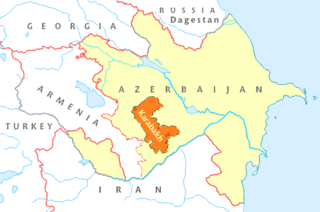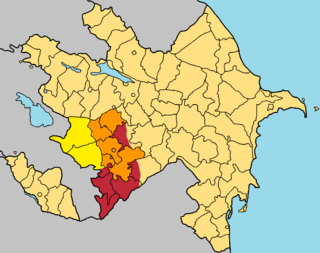
Artsakh, officially the Republic of Artsakh or the Republic of Nagorno-Karabakh, was a breakaway state in the South Caucasus whose territory was internationally recognised as part of Azerbaijan. Between 1991 and 2023, Artsakh controlled parts of the former Nagorno-Karabakh Autonomous Oblast of the Azerbaijani Soviet Socialist Republic, including its capital Stepanakert. It had been an enclave within Azerbaijan from the 2020 Nagorno-Karabakh war until the 2023 Azerbaijani offensive, when the Azerbaijani military took control over the remaining territory controlled by Artsakh. Its only overland access route to Armenia after the 2020 war was via the 5 km (3.1 mi) wide Lachin corridor, which was placed under the supervision of Russian peacekeeping forces.

Kalbajar District is one of the 66 districts of Azerbaijan. It is located in the west of the country and belongs to the East Zangezur Economic Region. The district borders the districts of Lachin, Khojaly, Agdam, Tartar, Goranboy, Goygol and Dashkasan districts of Azerbaijan, as well as the Gegharkunik and Vayots Dzor provinces of Armenia. Its capital and largest city is Kalbajar. As of 2020, the district had a nominal population of 94,100.
The OSCE Minsk Group was created in 1992 by the Conference on Security and Cooperation in Europe (CSCE), now Organization for Security and Co-operation in Europe (OSCE), to encourage a peaceful, negotiated resolution to the conflict between Azerbaijan and Armenia over Nagorno-Karabakh.

The Nagorno-Karabakh conflict was an ethnic and territorial conflict between Armenia and Azerbaijan over the region of Nagorno-Karabakh, inhabited mostly by ethnic Armenians until 2023, and seven surrounding districts, inhabited mostly by Azerbaijanis until their expulsion during the 1990s. The Nagorno-Karabakh region was entirely claimed by and partially controlled by the breakaway Republic of Artsakh, but was recognized internationally as part of Azerbaijan. Azerbaijan gradually re-established control over Nagorno-Karabakh region and the seven surrounding districts.

Relations have always been strong between Azerbaijan and Turkey, the only two predominantly Turkic countries located west of the Caspian Sea. Former Azerbaijani president Heydar Aliyev often described the two as being "one nation, two states."

United Nations Security Council resolution 874, adopted unanimously on 14 October 1993, reaffirmed sovereignty and territorial integrity of the Azerbaijani Republic and of all other States in the region, called for the preservation of the ceasefire, cessation of hostilities and withdrawal of forces from recently occupied districts of the Republic of Azerbaijan, and reaffirmed resolutions 822 (1993) and 853 (1993). The Council expressed its concern at "...the conflict in and around the Nagorny Karabakh region of the Azerbaijani Republic, and of the tensions between the Republic of Armenia and the Azerbaijani Republic...", and called upon the parties to observe the ceasefire agreed with by the government of Russia and OSCE Minsk Group.

United Nations Security Council resolution 884, adopted unanimously on 12 November 1993, after reaffirming resolutions 822 (1993), 853 (1993) and 874 (1993), the Council expressed its concern at the continuing conflict between Armenia and Azerbaijan in Nagorno-Karabakh and condemned violations of the ceasefire between the parties, particularly the occupation of the Zəngilan district and city of Goradiz. Resolution 884 is the fourth and last of the resolutions adopted by the UN Security Council regarding the Nagorno-Karabakh conflict.

The Armenian-occupied territories surrounding Nagorno-Karabakh were areas of Azerbaijan, situated around the former Nagorno-Karabakh Autonomous Oblast (NKAO), which were occupied by the ethnic Armenian military forces of the breakaway Republic of Artsakh with military support from Armenia, from the end of the First Nagorno-Karabakh War (1988–1994) to 2020, when the territories were returned to Azerbaijani control by military force or handed over in accordance to the 2020 Nagorno-Karabakh ceasefire agreement. The surrounding regions were seized by Armenians under the justification of a "security belt" which was to be traded for recognition of autonomous status from Azerbaijan.

The Madrid Principles were proposed peace settlements of the Nagorno-Karabakh conflict, proposed by the OSCE Minsk Group. The OSCE Minsk Group was the only internationally agreed body to mediate the negotiations for the peaceful resolution of the conflict prior to the renewed outbreak of hostilities in 2020. Senior Armenian and Azerbaijani officials had agreed on some of the proposed principles but made little or no progress towards the withdrawal of Armenian forces from occupied territories or towards the modalities of the decision on the future Nagorno-Karabakh status.

United Nations General Assembly Resolution 62/243, titled "The Situation in the Occupied Territories of Azerbaijan", is a resolution of the United Nations General Assembly about the situation in Nagorno-Karabakh, which was adopted on March 14, 2008 at the 62nd session of the General Assembly. It became the seventh United Nations document concerning Nagorno-Karabakh and the third and last United Nations General Assembly document on it.
Organisation of the Islamic Conference of Foreign Ministers Resolution 10/37, titled "The aggression of the Republic of Armenia against the Republic of Azerbaijan", is a set of three Organisation of the Islamic Conference resolutions on Nagorno-Karabakh conflict adopted at the 37th annual session of Foreign Ministers of OIC member states on May 18–20, 2010 held in Dushanbe, Tajikistan. The session was attended by 80 delegations from member states, observer states and international organizations.

The Law on Abolishment of Nagorno-Karabakh Autonomous Oblast was a motion passed by the Supreme Soviet of the Republic of Azerbaijan and signed into law by the President of Azerbaijan Ayaz Mutalibov on November 26, 1991. The law had been prompted by a vote in the National Assembly of the Nagorno-Karabakh Autonomous Oblast in favor of uniting itself with the Armenian SSR on 20 February 1988. The vote was followed by an independence referendum in 1991 which was boycotted by the Azerbaijani population of the Oblast; most voted in favor of independence. While these votes and elections had mainly been conducted in a relatively peaceful manner, in the following months, as the Soviet Union disintegrated, it gradually grew into an increasingly violent conflict between ethnic Armenians and ethnic Azerbaijanis. Both sides claimed that ethnic cleansing was being carried out. The declaration of secession from Azerbaijan was the final result of a territorial conflict regarding the land.
Council of Europe Parliamentary Assembly (PACE) Resolution 1416 (2005), titled “The conflict over the Nagorno-Karabakh region dealt with by the OSCE Minsk Conference”, is a resolution of PACE about the situation on occupied territories currently in the possession of Azerbaijan by Armenian military forces, adopted by PACE on January 25, 2005.

The political status of Nagorno-Karabakh remained unresolved from its declaration of independence on 10 December 1991 to its September 2023 collapse. During Soviet times, it had been an ethnic Armenian autonomous oblast of the Azerbaijan Soviet Socialist Republic. Following the dissolution of the Soviet Union, a conflict arose between local Armenians who sought to have Nagorno-Karabakh join Armenia and local Azerbaijanis who opposed this.
Azerbaijan has been a member in the United Nations since March 2, 1992, after the UN General Assembly admitted Azerbaijan at its 46th session. The Permanent Mission of the Republic of Azerbaijan was opened in New York City in May 1992. On October 29, 1991, soon after gaining independence from the Soviet Union, Azerbaijan applied to the UN General Assembly for joining the organization. Azerbaijan was elected as a non-permanent member of the UN Security Council for the term of 2012–2013.
In 1991, Azerbaijan joined the Organisation of Islamic Cooperation and started to build relations with the organization. As a result, the ambassador of Azerbaijan to Saudi Arabia was given a mandate of permanent representative of Azerbaijan to the General Secretariat of the OIC in May 1994.

Relations between Azerbaijan and the Organization for Security and Cooperation in Europe (OSCE) began when Azerbaijan joined OSCE’s predecessor, the Conference on Security and Cooperation in Europe (CSCE), on January 30, 1992. This was the first European organization Azerbaijan joined. The CSCE transformed into the OSCE shortly afterwards in 1995.
The following is list of the official reactions to the Second Nagorno-Karabakh War.

An OSCE Needs Assessment Team in Armenia was deployed by the Organization for Security and Co-operation in Europe (OSCE) in the territory of the Republic of Armenia between 21 and 27 October 2022 following the Armenia–Azerbaijan border crisis.
Council of Europe Parliamentary Assembly (PACE) Resolution 2085 (2016) of 26 January 2016 is a resolution in which PACE expressed its concern about the ongoing artificial humanitarian situation in Azerbaijan because of the water crisis deliberately created by Armenia in the aftermath of the Nagorno-Karabakh conflict. The resolution is entitled "Inhabitants of frontier regions of Azerbaijan are deliberately deprived of water". The document makes specific references to the Helsinki Rules on the Uses of the Waters of International Rivers and Berlin Rules on Water Resources, emphasising the importance of ensuring the right to use water and its obligatory nature for states. PACE also recalls the statement of 20 May 2014 by the OSCE Minsk Group Co-Chairs.














